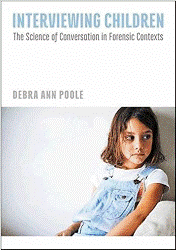“Interviewing Children: The Science of Conversation in Forensic Contexts”

“Interviewing Children: The Science of Conversation in Forensic Contexts
By Debra Ann Poole
American Psychological Association
Washington, D.C., 2016
Book on interviewing is `top of the line’
Reviewed by James K. Luiselli, Ed.D., ABPP, BCBA-D
This book is an in-depth examination of forensic interviewing with children, written by a psychologist who specializes in eyewitness testimony and conversational techniques. Her thesis is that “adults usual style of conversing with children is inappropriate in forensic contexts,” causing child informants to speculate, misinterpret questions and answer falsely.
The book describes forensic interviewing as a problem solving approach “that will decide which of several alternatives is most consistent with the evidence.” Among many guidelines, the author stresses that interviewers should test competing hypotheses about the information children reveal, use techniques that are developmentally and culturally sensitive and distinguish between forensic and clinical roles.
There are many examples of child-interviewer dialogue presented in the book that illustrate both proper techniques and common procedural errors. Numerous recommendations are available for easy reference in a series of “quick guide” tables as well as other tips that the author provides.
The author also breaks down several phases of a comprehensive interview, beginning with steps that prepare children to discuss the events leading to investigation. She makes it clear that preparation details are vital to ensure accurate fact finding.
In what is described as the “case issues” phase, an interviewer is “squarely focused on eliciting testimony,” which the author summarizes as raising the investigative topics, eliciting a free narrative, certifying details and closing the interview. Several interview protocols are contained in the book including suggestions for adjusting techniques when unanticipated conversational pitfalls arise.
Throughout the book, and elaborated in a separate chapter, the author discusses how “professionals customize interviews when they decide which issues to explore and which interviewing strategies to use.” Of particular value, the book details methods for interviewing very young children and youth who have communication, intellectual and developmental disabilities.
The concluding chapter in the book covers interviewer training, supervision and professional development. Chapter contents describe characteristics of effective training programs, technology-based instruction, applications of performance feedback and maintaining practice standards.
This book succeeds on many levels. First, the author addresses the very complex area of forensic interviewing of children with clarity and precision. She translates concepts and principles into methods that mental health professionals can apply in everyday practice.
Secondly, the book is indeed constructed from a science perspective. Virtually every methodology that the author advocates is supported by research evidence from multiple forensic disciplines.
Finally, the author is careful to point out that forensic specialists must consistently revise and adapt techniques depending on the unique circumstances of each child interview. She shows remarkable insight in this regard, encouraging flexibility when planning and implementing interviews.
This book is a must read for any forensic mental health professional working with children and highly recommended as a text in graduate school and post-graduate training programs. It is the most practice relevant resource available and top of the line in every way.
James K. Luiselli, Ed.D., ABPP, BCBA-D is a clinical psychologist in private practice and Adjunct Faculty in the School Psychology Program at William James College.
Learn more about the book: Interviewing Children: The Science of Conversation in Forensic Contexts
